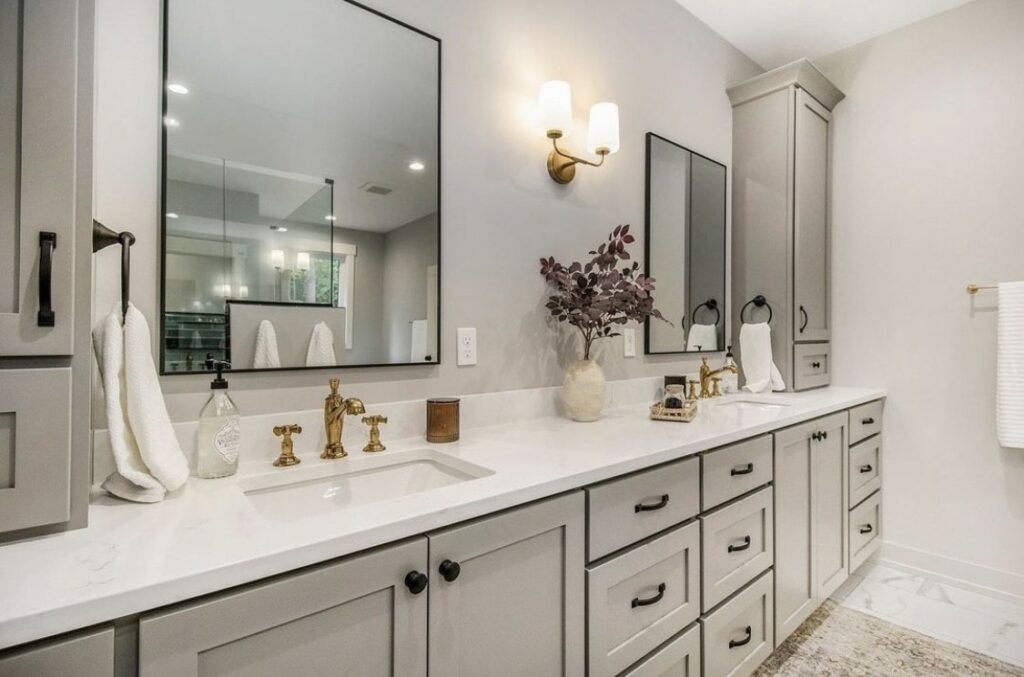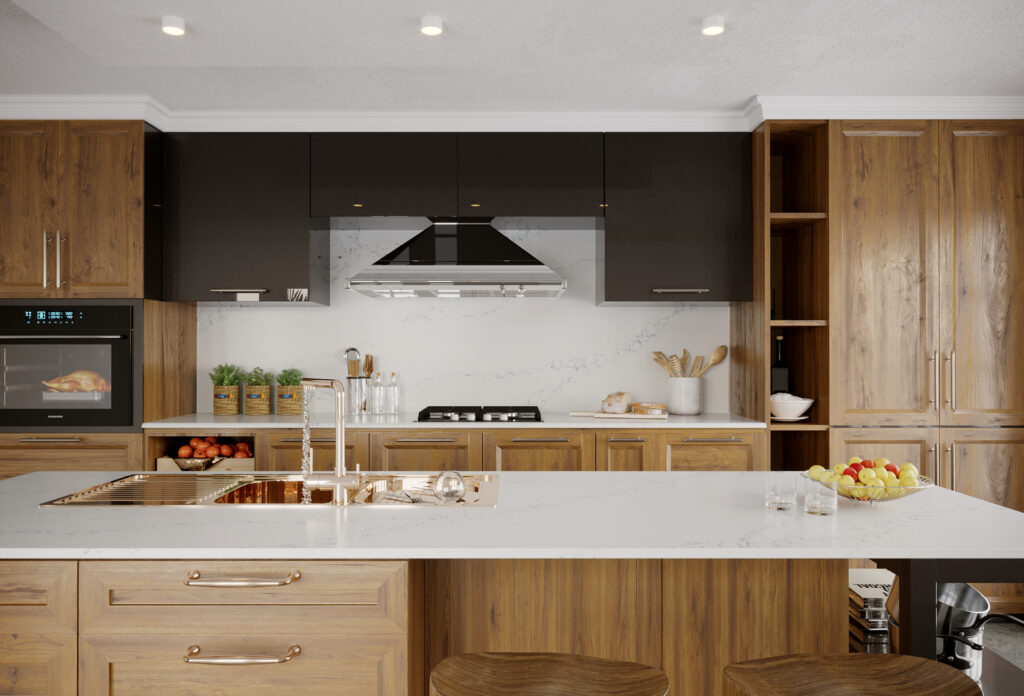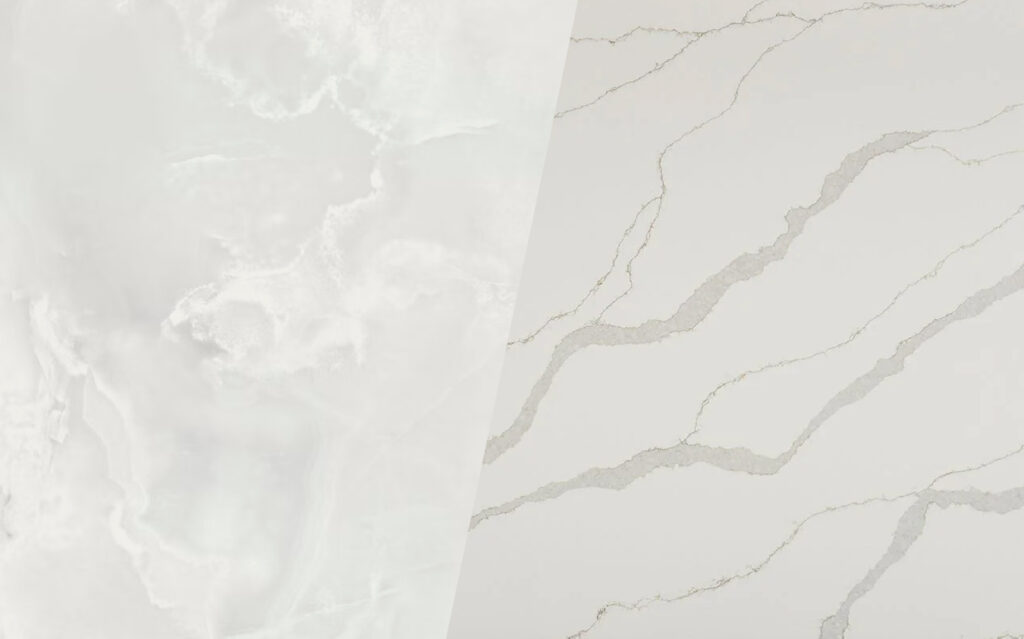Torn between porcelain and quartz countertops? We get it! Choosing the right surface can be a big decision. Your countertops should reflect your style, handle daily wear, and bring your space together. Whether you’re remodeling or building a kitchen, bathroom, or commercial space, both porcelain and quartz offer beautiful, durable options.
Let’s break down the differences so you can choose with confidence.

What is Porcelain?
Porcelain is created by firing a mixture of fine-grained clay, feldspar, silica, and other minerals at upwards of 2100 degrees Fahrenheit. This process creates a dense, durable porcelain countertop surface that resists heat, stains, and everyday wear.
While porcelain has been used around the world for centuries, it has become an increasingly popular choice for modern kitchens and bathrooms thanks to its sleek appearance and strength. Though not indestructible, porcelain is easy to maintain and holds up well in busy spaces, making it a smart and stylish option for countertops.

What is Quartz?
Quartz is an engineered stone surface made by combining roughly 90-95% ground natural quartz—one of the hardest minerals on Earth—with 5-10% resins, polymers, and pigments. The result is a strong, non-porous material that resists stains and scratches while offering a wide variety of colors and patterns.
Because they’re man-made, quartz countertops can be designed to replicate the look of natural stone or feature more modern, uniform designs not found in nature. First introduced to the market about 60 years ago, quartz has become a popular choice for both residential and commercial spaces thanks to its durability, low maintenance, and lasting beauty.
Countertop Appearances
Porcelain
Porcelain countertops offer a sleek, modern look with a thin profile ideal for both kitchens and bathrooms. Thanks to high-resolution inkjet printing, porcelain surfaces can beautifully mimic natural materials like marble or stone. However, these designs are applied to the surface only and do not feature through-body veining. Because the veining doesn’t run through the entire slab, mitered edges are often recommended to help create a more natural, continuous look.
Porcelain is available in a wide range of colors and patterns, with popular tones including white, gray, black, and brown.
Quartz
Quartz countertops have a rich, consistent look that comes from blending natural quartz crystals with resin. One key advantage of quartz is that its veining and color run through the entire slab—offering greater design flexibility and a more natural look at edges and across cuts.
Available in a variety of colors—from bright whites to deep blacks—quartz can feature anything from subtle speckling to dramatic marble-like veining. It also supports more variation in edge styles and surface textures, making it a favorite for both classic and contemporary spaces.
Countertop Finishes
Porcelain
Porcelain countertops typically come in two finish options: matte or high-gloss. These finishes are applied during manufacturing, rather than added after installation. A high-gloss finish gives a sleek, polished appearance, while a matte finish offers a softer, more natural, and rustic look. While porcelain has fewer finish options than quartz, both finishes are stylish and easy to maintain.
Quartz
Quartz countertops are available in a wider variety of finishes, including polished, honed, and leathered. Polished quartz has a shiny, reflective look, while honed or brushed quartz has a smooth, matte look. Leathered quartz features a soft sheen and subtle texture. Each finish has a distinct style.
Durability & Scratch Resistance
Porcelain
Porcelain countertops are extremely durable and resistant to heat, stains, and most scratches. While lighter and thinner than quartz, porcelain is actually about 30% stronger than granite. That said, because it’s a more delicate material during handling, it can be more prone to chips or cracks. But once it’s in place, porcelain holds up well under daily use.
Quartz
Quartz is a thicker, heavier material that’s built to last. It’s highly scratch-resistant, though not completely scratch-proof—harsh abrasives can scratch the resin. Still, quartz stands up to everyday wear outstandingly, making it a dependable choice for high-traffic kitchens and bathrooms. Its solid structure also makes it easier to install with fewer risks of damage.
Porosity & Stain Resistance
Porcelain
Porcelain countertops have a very low absorption rate—0.05%—making them highly water-resistant and a great choice for kitchens and bathrooms. While porcelain resists most stains better than natural stone, very strong or highly pigmented substances may still leave a mark if not cleaned promptly.
Quartz
Quartz is an engineered, 99.9% non-porous material, meaning it resists moisture and staining exceptionally well. Liquids and spills won’t seep into the surface, making quartz an ideal option for areas where messes are common. While not completely stain-proof, most marks can be removed with basic cleaning or specialized products.
Heat Resistance
Porcelain
Porcelain countertops offer excellent heat resistance. They can handle high temperatures without warping, scorching, or discoloration—even in areas exposed to direct sunlight. This makes porcelain a top choice for homeowners who frequently cook or enjoy outdoor kitchens.
Quartz
While quartz can withstand short-term exposure to heat, placing hot pans or pots directly on the surface may cause damage over time, such as discoloration or cracking. To protect your quartz countertops, it’s best to use trivets or hot pads.
Indoor & Outdoor Use
Porcelain
Porcelain is a great choice for both indoor and outdoor applications. It’s UV-resistant, handles extreme temperatures well, and won’t crack or fade from sun exposure or cold weather. Its non-porous surface also makes it easy to clean and resistant to stains and scratches.
Quartz
Quartz is best used indoors only. Prolonged exposure to direct sunlight or outdoor elements can cause fading, discoloration, or surface damage over time. For long-lasting beauty and performance, keep quartz surfaces inside.
Cost
When comparing the cost of porcelain countertops and quartz, both materials fall within a similar price range, though specific pricing can vary based on the style, finish, and installation requirements.
Porcelain
The cost of porcelain countertops typically ranges from $55 to $120 per square foot. While pricing can vary depending on the design and thickness, porcelain remains a competitive option for high-end looks and durability. Wondering “Is porcelain cheaper than quartz?” In some cases, yes, but it depends on the specific product.
Quartz
Quartz countertops typically cost anywhere from $45 to $200 per square foot. Factors like brand, design complexity, and finish will influence where your project falls within that range.
To get an accurate estimate for your space, reach out to Premier Granite & Stone today—we’re happy to help you explore your options.
Installation
Porcelain
Porcelain countertops are lightweight and versatile, making installation simpler in many cases. A key advantage is that they can often be installed directly over existing countertops, which can help reduce labor time and costs.
Quartz
Quartz countertops are heavier and require more structural support. Installation typically involves removing any existing countertops, and the slabs must be placed directly on quality cabinetry. If the underlying cabinets are outdated or unstable, they may need to be replaced to ensure proper support.
Maintenance
When it comes to upkeep, both porcelain and quartz countertops are low-maintenance and easy to care for. Regular cleaning with a damp microfiber cloth and a mild, non-abrasive cleanser is usually all that’s needed.
Neither material requires sealing, unlike natural stones such as granite or marble. As long as spills are cleaned up promptly, both surfaces will maintain their beauty and performance for years to come.

Porcelain Countertops Vs. Quartz: Which Material is Right for You?
When choosing between porcelain and quartz, it all comes down to your needs and preferences. For example, porcelain is great for outdoor use and heat resistance, while quartz offers superior stain resistance and a wide range of finishes.
At Premier Granite & Stone, we’ll help you find the right fit for your space, style, and budget. Bring in your tile, fixtures, or samples to match finishes with ease. From design to fabrication and installation, we’re your trusted partner for high-quality porcelain and quartz countertops.
Explore our selection online, visit our Michigan or Indiana showrooms, or contact us to get started.

